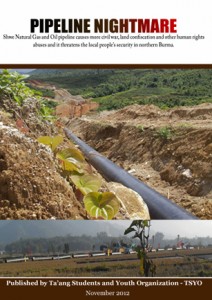Posts Tagged ‘Forced Labor’ (57 found)
Update of Human Right Violations by the Burma Army During Offensives in Palaung Areas (March and April 2013)
Since January 2013, Burmese government troops have been carrying out military offensives in Palaung areas against the Shan State Army-North (SSA-N), Kachin Independence Army (KIA) and Ta’ang National Liberation Army (TNLA). The Burmese troops have committed widespread human rights violations during these operations […]
• • •Human Rights Violations Perpetrated Against the Chin in Burma (March 2011 – March 2013)
Documentation from human rights groups shows that in fact, serious human rights violations continue across the country under President Thein Sein’s government, with particularly severe consequences for ethnic and religious minorities. For the predominantly Christian Chin people, this includes violations of religious freedom, forced labour, sexual violence, and extra-judicial killing, despite the fact that a ceasefire between armed resistance group the Chin National Front (CNF) and the government is holding […]
• • •Losing Ground: Land Conflicts and Collective Action in Eastern Myanmar
Analysis of KHRG’s field information gathered between January 2011 and November 2012 in seven geographic research areas in eastern Myanmar indicates that natural resource extraction and development projects undertaken or facilitated by civil and military State authorities […]
• • •Shwe Pipeline Brings Land Confiscation, Militarization and Human Rights Violations to the Ta’ang People
The Ta’ang Students and Youth Organization (TSYO) released a report today called “Pipeline Nightmare” that illustrates how the Shwe Gas and Oil Pipeline project, which will transport oil and gas across Burma to China, has resulted in the confiscation of people’s lands, forced labor, and increased military presence along the pipeline, affecting thousands of people.
Moreover, the report documents cases in 6 target cities and 51 villages of human rights violations committed by the Burmese Army, police and people’s militia, who take responsibility for security of the pipeline […]
• • •Pipeline Nightmare
 Shwe Pipeline Brings Land Confiscation, Militarization and Human Rights Violations to the Ta’ang People
Shwe Pipeline Brings Land Confiscation, Militarization and Human Rights Violations to the Ta’ang People
This report illustrates how the Shwe Gas and Oil Pipeline project, which will transport oil and gas across Burma to China, has resulted in the confiscation of people’s lands, forced labor, and increased military presence along the pipeline, affecting thousands of people […]
• • •Forced Labour Against The Rohingya Persists in the Aftermath of the June 2012 Communal Violence in North Arakan/Rakhine State
The systemic and discriminatory practice of forced labour against the Rohingya, has continued, or even intensified, across large areas of North Arakan/Rakhine State in Burma/Myanmar, since deadly communal violence broke […]
• • •Briefing: Forced Labour in Chin State and Sagaing Region, 2011 – 2012
From January 2011 to date, CHRO has documented 20 separate incidents of forced labour, some involving orders to multiple villages. 50 percent of the incidents involved orders from the Burma Army (typically portering), and the other half were orders from the local authorities (typically road construction, planting jatropha, and other forms of manual labour) […]
• • •EU Moving To Reward Promises Rather Than Results
The ITUC is deeply concerned by the 15 June joint statement by EU High Representative Catherine Ashton and EU Trade Commissioner Karel De Gucht calling for the rapid reinstatement of the Generalised System of Preferences (GSP) for Myanmar […]
• • •Forced Labour Still Prevails: An Overview of Forced Labour Practices in North Arakan, Burma
This report by the Arakan Project offers an overview of forced labour practices in Northern Arakan/Rakhine State of Burma/Myanmar over a 6-month period – from November 2011 to May 2012 […]
• • •Revisiting Human Rights in Myanmar
On 23 May 2012, Amnesty International concluded its first official visit to Myanmar since 2003. This report illustrates Amnesty’s general impressions of the current human rights situation, and looks at five specific topics: political imprisonment, rule of law, ethnic minorities, accountability, and economic, social and cultural rights.
• • •








 All posts
All posts